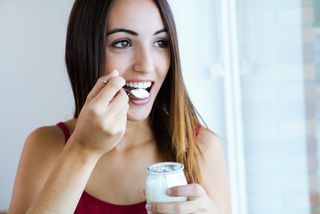
Weight-Loss Superfood: 6 Tips for a Healthy Gut

Katherine Tallmadge is a registered dietitian; president of Personalized Nutrition noted motivational and wellness speaker; author of "Diet Simple: 195 Mental Tricks, Substitutions, Habits & Inspirations"; (LifeLine Press, 2011) and a regular contributor to LiveScience.com. This article is an exclusive for Live Science's Expert Voices: Op-Ed & Insights.
Over the years, I've noticed that clients who added a certain item to their diet seemed more likely to lose weight. And this happened even when their calorie intake remained the same. What is this superfood? It's nothing weird, and it's not a supplement — just a product that appears to go back to Neolithic times: yogurt.
For years, I've wondered why this versatile food worked so well, and now, new scientific research is backing my observations. It turns out that the bacterial organisms in the digestive tract — about 100 million of them (10 times the number of human cells), collectively called the microbiome — are akin to a fully functioning organ, and can have a positive or negative effect on human health.
At a U.S. National Institutes of Health (NIH) conference entitled "The Human Microbiome: Implications for Nutrition and Clinical Practice," held in March in Bethesda, Md., Cindy Davis of the Office of Dietary Supplements at the National Institutes of Health, shared some of the findings. "The microbiome is influenced by several dietary components," she said. One of which is yogurt.
Probiotics plus prebiotics
Why is this? Yogurt contains a class of bacteria called probiotics that "remain alive during processing and shelf life, survive digestion and then cause health benefits," said Jo Ann Hattner, a registered dietitian, consultant at the Stanford University School of Medicine and co-author of "Gut Insight." She added that together with certain foods known as prebiotics, probiotics create a symbiotic relationship that profoundly benefit your microbiome and your health.
"Prebiotics are nondigestible, fermentable carbohydrates that stimulate and promote activity of beneficial gut bacteria," Hattner co-wrote in a recent issue of San Francisco Medicine, a publication of the San Francisco Medical Society. "Prebiotics are the booster substance for probiotics. As the beneficial gut microbes increase in number, pathogenic bacteria — such as Salmonella, Campylobacter and E. coli — decrease.""Ingesting prebiotics is a practical way of manipulating the microbiota, since they support and increase the beneficial bacteria population in the gut," Hattner added. "Together, probiotics and prebiotics are an important duo. In addition, prebiotic fibers are components of the healthiest foods on the planet — natural plant foods."
Sign up for the Live Science daily newsletter now
Get the world’s most fascinating discoveries delivered straight to your inbox.
To achieve maximum benefit, you need both kinds of food: probiotics and prebiotics, and new research is finding the health benefits may be vast.
"These bacteria protect us by preventing infection and enhancing immunity, and that makes gastrointestinal health critical to overall health," Hattner said.
More benefits of the microbiome
In addition, research is finding that a healthy microbiome may play a role in reducing inflammation, a risk factor involved in illnesses ranging from colds to cancer, heart disease, arthritis and cognitive decline.
These bacteria may also help burn body fat and reduce insulin resistance, a precursor to diabetes, according to a recent study published in the journal Nutrients. Interestingly, "Mother's milk contains both pre[biotics] and probiotics," said Hattner, so it transfers the health benefits to the baby. This may explain studies that show people who were not breastfed are more likely to be overweight.
Prebiotics are important because they nourish the probiotics, increasing their effectiveness — and prebiotics are in a host of foods.
Still, nutritionists are in the initial phases of human research, and there is much to be learned. In the meantime, the message is clear: Eat a plant-based diet and plenty of yogurt!
6 Tips for a Healthy Microbiome
1. Eat probiotics like yogurt, kefir and soy yogurt
2. Eat prebiotics (from Hattner's article) such as:
- fruits like apples, bananas, berries, raisins and kiwifruit - agave; - greens, onions, garlic and leeks - lentils, chickpeas and beans - brown rice, corn, buckwheat, flaxseed, whole wheat, whole rye, barley - almonds - honey - green tea
3. Use artificial sweeteners with caution. (A preliminary study found that artificial sweeteners may effect the microbiome negatively, increasing body fat and insulin resistance.)

4. Eat less meat, as it damages the microbiome. (This was discussed at the NIH conference, though research is ongoing as to why.)
5. Breastfeed your baby.
6. Don't count on probiotic pills or supplements to improve your microbiome, as there isn't one that has passed the tests needed for a health claim. (This was also a point made by scientists at the NIH conference.)
The importance of your digestive system's microbiome should not be underestimated. It affects every organ in the body, bringing about sickness or health. Many experts believe this research is bringing about a revolution in health care.
Interestingly, the recommendations registered dietitians and nutritionists have been making for decades is being proven correct: "Eat a plant-based diet!" Just be sure to include fermented foods, such as yogurt!
Editor's Note: You can see all of Tallmadge's nutrition posts on her Expert Voices landing page.
Tallmadge's most recent article was "Eat More Early, Eat Less at Night." Follow all of the Expert Voices issues and debates — and become part of the discussion — on Facebook, Twitter and Google+. The views expressed are those of the author and do not necessarily reflect the views of the publisher. This version of the article was originally published on Live Science.
Most Popular

